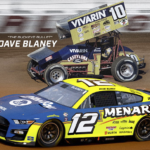
RYAN BLANEY UNVEILS THROWBACK PAINT SCHEME FOR 2023 DARLINGTON RACE
May 2, 2023
BORN TO BE A RACE CAR DRIVER, RYAN BLANEY IS SETTING THE NASCAR WORLD ON FIRE
June 23, 2023NASCAR’S BLANEY: IN RACE AGAINST ALZHEIMER’S, DETECTION IS MOST CRUCIAL LAP
As a third-generation race-car driver, I come by the "family business" very naturally. My grandfather Lou started the family tradition, racing sprint cars and modified stock cars. Over the course of his 47-year career, he won more than 600 races.
He always seemed invincible to me. But that changed when he was diagnosed with Alzheimer's disease in 2001. Every time I visited him, he seemed to deteriorate further, and I saw how deeply that affected my dad and grandma. In 2009, Grandpa Lou passed away from complications of Alzheimer's.
More than 6 million Americans are living with Alzheimer's, and over 11 million family members and friends are their unpaid caregivers. That's a huge burden for all of us to carry.
One of the biggest problems around Alzheimer's is that people aren't talking about it. They aren't talking about it with each other, and they aren't talking about it with their doctors. From what has been shared with me, and according to the Alzheimer's Association 2023 Alzheimer's Disease Fact and Figures report, only four in 10 Americans say that they would talk to their doctor if they were experiencing symptoms of mild cognitive impairment - an early stage of memory loss or the loss of another cognitive ability.
It's never been easy for my family to talk about Alzheimer's or what happened to my grandpa. But the disease took a lot from us, and I'm committed to using my voice to help others. I want people to know it's important to talk about it and it's important to take action.
Getting a diagnosis of Alzheimer's early is more critical than ever before. Treatments that slow the progression of the disease are starting to become available, but are only effective in the early stages.
An early diagnosis gives you more time to plan for the future. Together, you and your family can make decisions about care needs and finances. The person living with the disease can explore treatment options and explore participation in clinical trials. And the entire family can access support services through the Alzheimer's Association.
But to get a diagnosis, families need to be able to recognize the signs of the disease, which can be hard to spot. One cue is to look for changes in normal behavior or activities. Is the person unable to do something that once was easy? Difficulty remembering recent information - such as names, conversations, and dates - and getting lost in familiar places may also be red flags.
If you notice these signs in yourself or someone else, talk about it. It's hard, but take it from me - it's worth it. Make a plan to see a doctor as soon as possible. Give your family the gift of more time together. More time for family reunions. More time for Birthday celebrations. More time for fishing trips. Or like mine, more time together at the racetrack.
Many people think winning in NASCAR is purely about going as fast as possible. It's not. It's about being hyper-attentive to what's going on around you, sensing opportunities and making the most of what's at your disposal - the mental, physical and mechanical tools available to you and your team.
The same is true for Alzheimer's. We can't beat it - yet. But by prioritizing early diagnosis and taking advantage of new treatments, we can give it a hell of a race.
Ryan Blany is a third-generation American professional stock car racing driver who competes full time in the NASCAR Cup Series.



